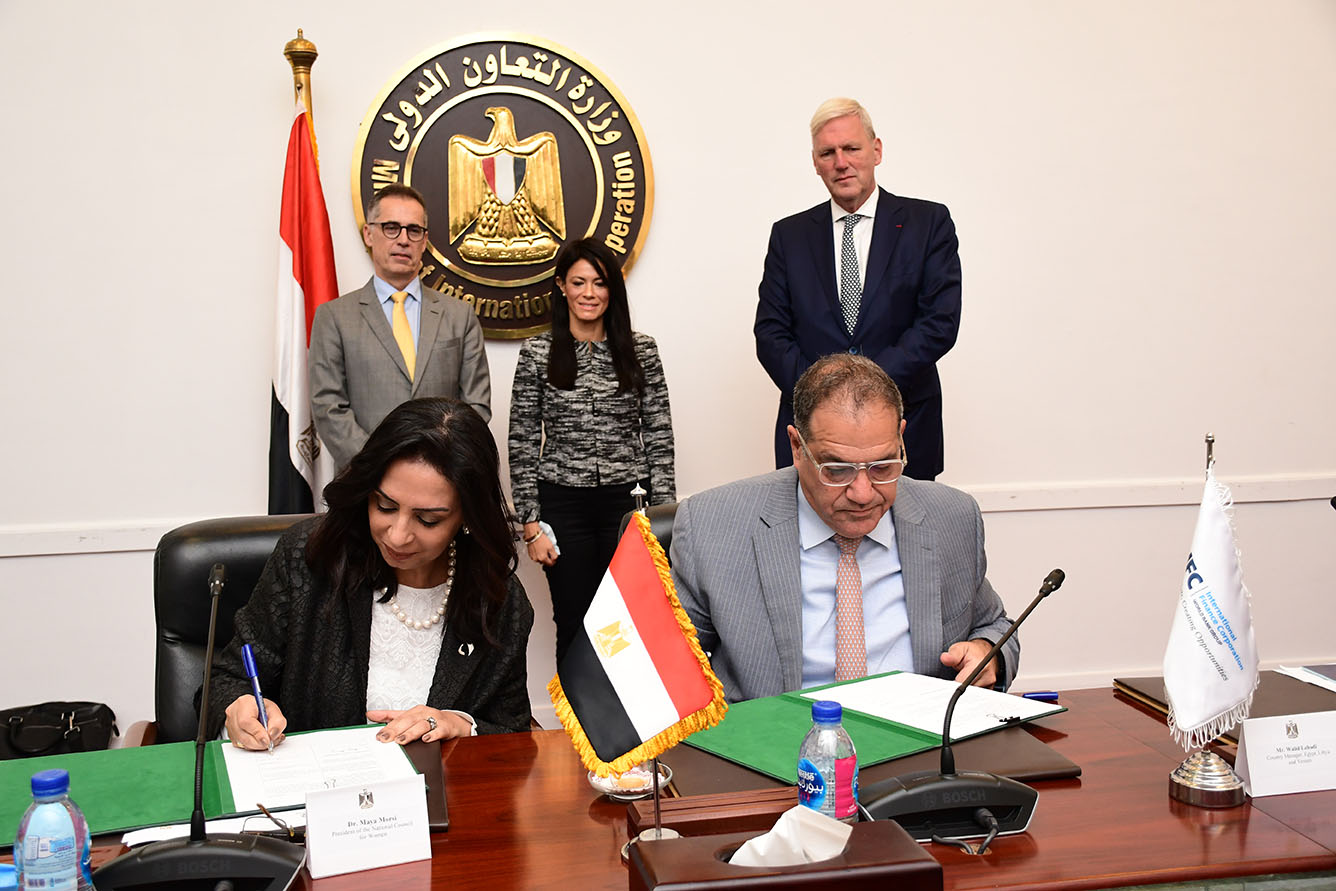
Cairo, Egypt, October 14, 2021—IFC and Egypt's National Council for Women signed an agreement today that will help increase women's economic participation, including by boosting their access to bank lending, promoting equal pay, and providing more flexible work options.
Over the next two years, IFC and the National Council for Women (NCW) will support Egypt's government in developing gender-neutral laws, which will help give women more equal access to economic opportunities in Egypt. The reforms will complement the government of Egypt's efforts to promote equal pay, increase access to finance, including for women entrepreneurs, and make it easier for women to work outside the home.
The project aligns with Closing the Gender Gap Accelerator, a joint initiative between the NCW, the World Economic Forum and the Ministry of International Cooperation, which aims to enhance the legal and regulatory frameworks that encourage women to fully participate in Egypt's economy.
"Such agreements play a profound role in economically empowering women and in pushing forward their efforts," said Minister of International Cooperation H.E. Dr. Rania A. Al-Mashat. "This agreement comes within the framework of the partnerships the Ministry of International Cooperation holds with bilateral and multilateral development partners to advance the achievement of Egypt's Vision 2030, which also aligns with the UN's Sustainable Development Goals (SDGs)."
Closing the Gender Gap Accelerator is the first public-private collaboration model in the MENA region aiming to increase women's participation in the labor force, close gender gaps in remuneration and investment, advance more women into management and leadership positions, and hardwire gender parity in the future of work.
"Economic empowerment for women is a priority for Egypt at this stage. We are delighted to join the partnership with the Ministry of International Cooperation and IFC and we will work under the umbrella of the National Strategy for Women's Empowerment 2030 to boost economic participation for women even more," said Dr. Maya Morsy, President of the National Council for Women in Egypt.
"Women in Egypt do not have the same economic opportunities as men. Addressing barriers that lead to this inequity is not only the right thing to do, it is key to enhancing decision making within companies, increasing the pool of talent from which companies can draw and, ultimately, helping jumpstart growth in Egypt, which is crucial to economic recovery in the wake of the COVID-19 pandemic," said Walid Labadi, IFC Country Manager for Egypt, Libya, and Yemen.
The IFC-NCW partnership is part of a broader effort by IFC to create economic opportunities for Egyptian women, only 20 percent of whom participated in Egypt's labor market in 2019, according to the International Labor Organization (ILO). Among other initiatives, in 2020, IFC launched a three-year advisory program to help private sector companies in Egypt tap into the country's large, underutilized female workforce.
The partnership is supported by the Kingdom of the Netherlands and Switzerland's State Secretariat for Economic Affairs.
About NCW
The National Council for Women is the national machinery for the advancement of women, its purpose, as mandated by Law 30 of 2018, is to ensure the empowerment of Egyptian women in terms of political, economic, social and cultural rights and as guaranteed by the constitution, and to ensure adaptation of these rights on the ground, considering the solid principles of social justice and equal opportunities, non-discrimination, protection, and empowerment.
About IFC
IFC—a member of the World Bank Group—is the largest global development institution focused on the private sector in emerging markets. We work in more than 100 countries, using our capital, expertise, and influence to create markets and opportunities in developing countries. In fiscal year 2021, IFC committed a record $31.5 billion to private companies and financial institutions in developing countries, leveraging the power of the private sector to end extreme poverty and boost shared prosperity as economies grapple with the impacts of the COVID-19 pandemic. For more information, visit www.ifc.org.
Stay Connected
www.facebook.com/IFCmena
www.twitter.com/IFC_menap
www.youtube.com/IFCvideocasts
Contacts
Stay Informed
Sign up to have customizable news & updates sent to you.